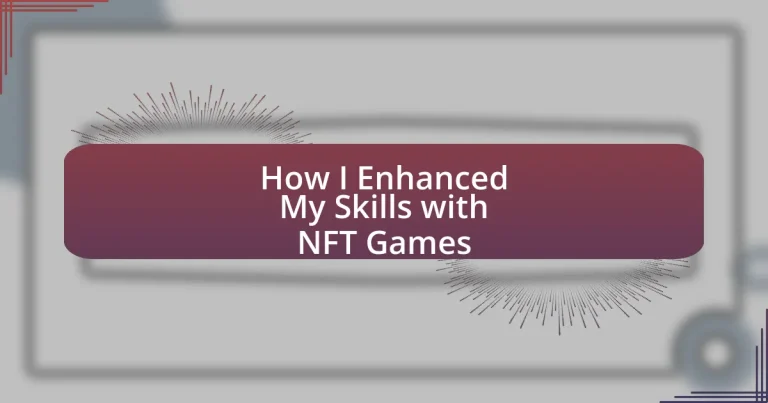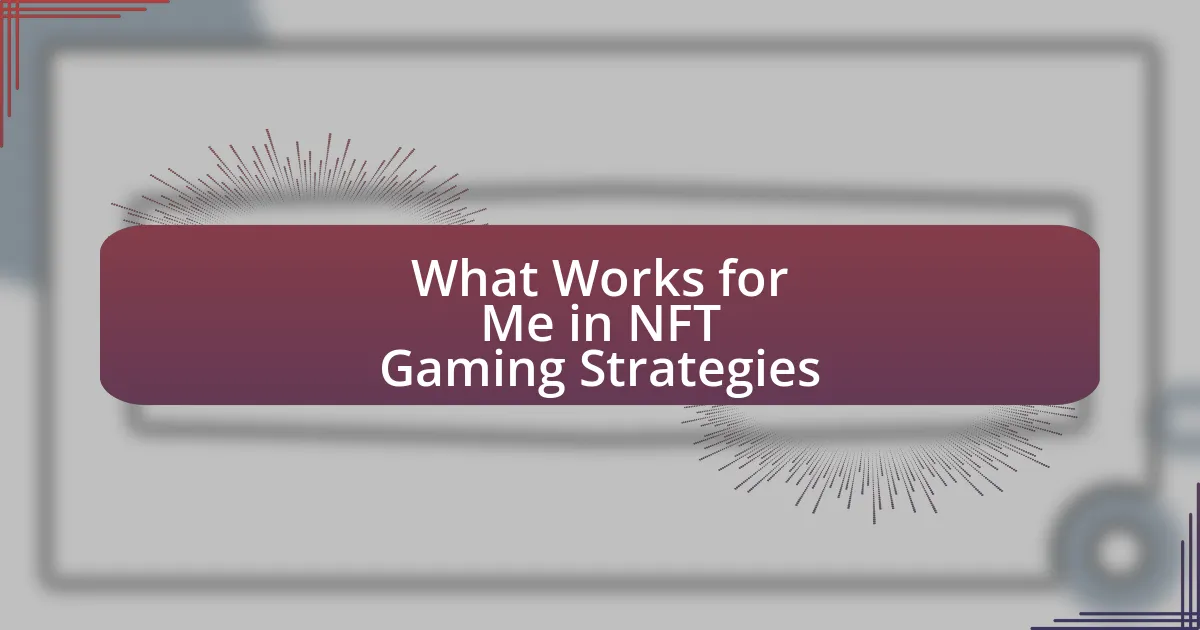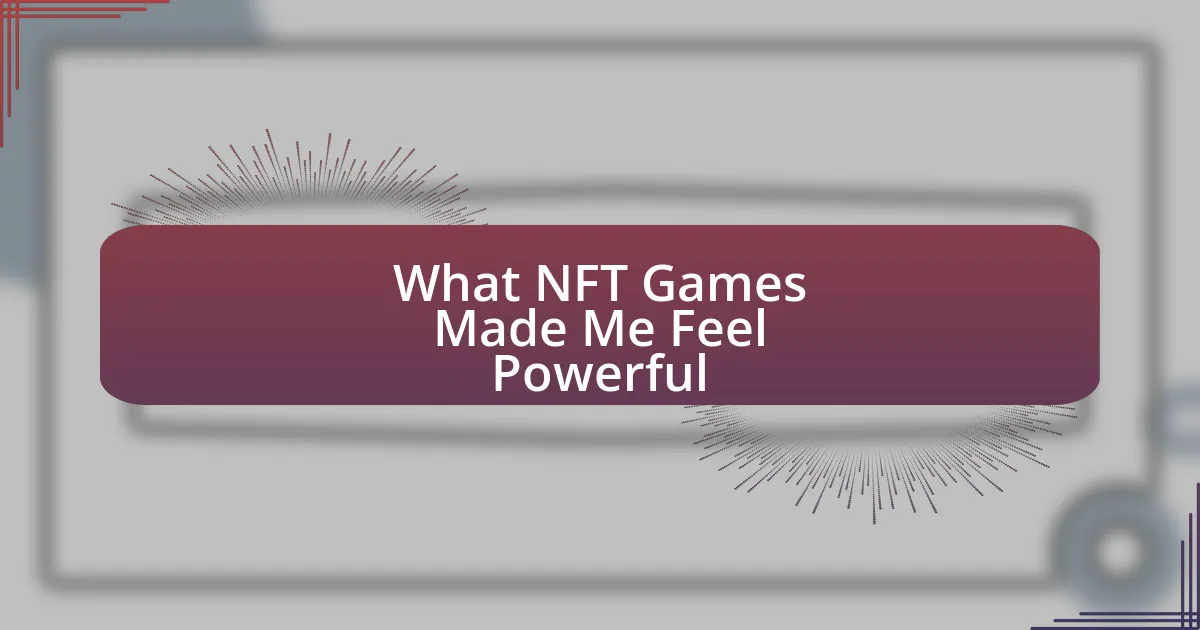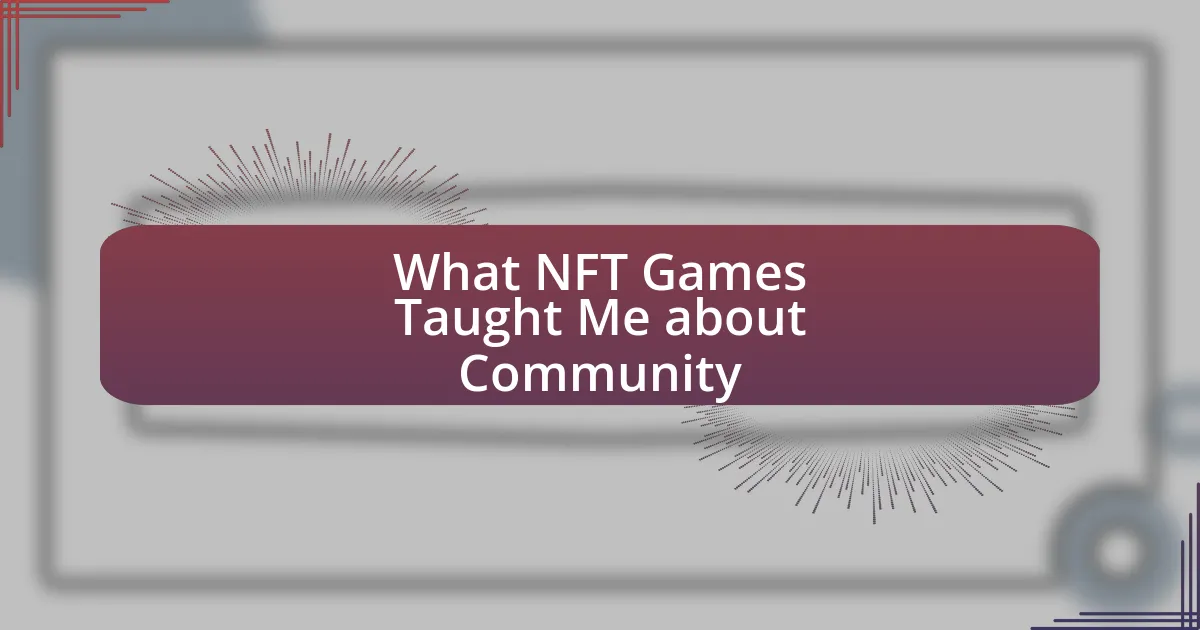Key takeaways:
- NFT games enhance player engagement through unique digital asset ownership, fostering a deeper connection and motivation.
- Participating in community forums and discussions provides valuable insights and collective learning opportunities.
- Developing skills in strategic planning, collaboration, and financial acumen through gaming translates into real-world applications.
- Tracking progress and setting personal goals in gaming leads to significant personal growth and skill development.
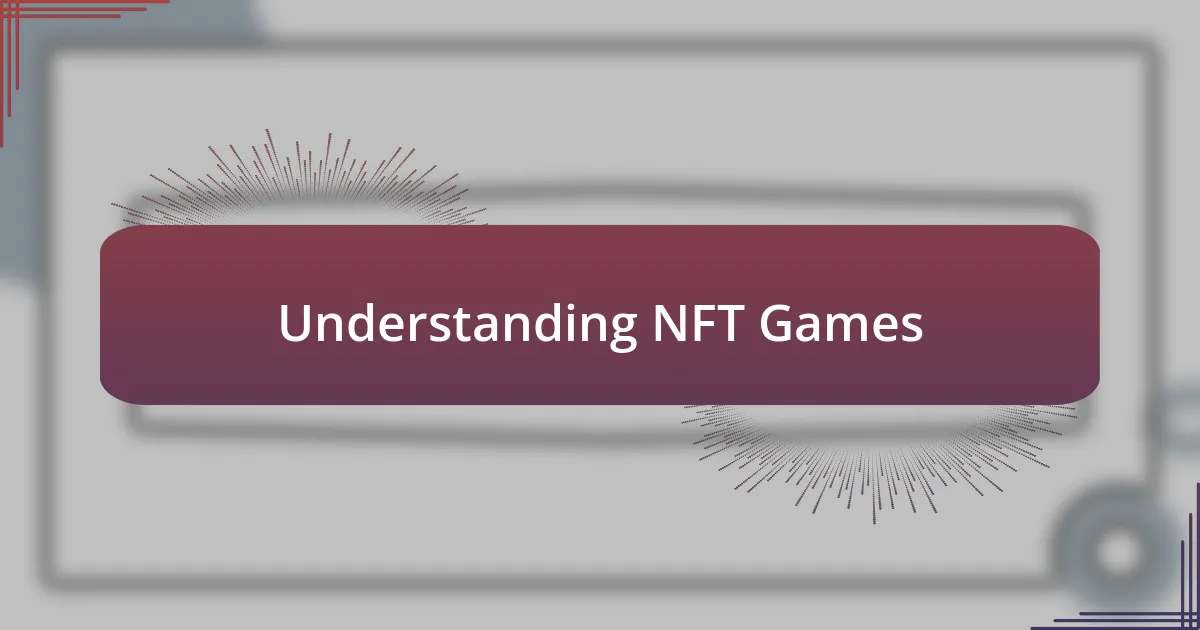
Understanding NFT Games
NFT games are an exciting intersection of gaming and blockchain technology, where players own unique digital assets. I still remember the thrill I felt when I acquired my first NFT character; it wasn’t just a game piece; it became part of my digital identity. Doesn’t it seem fascinating that each player holds a one-of-a-kind token that can appreciate in value?
These games typically use non-fungible tokens (NFTs) to represent in-game assets, which means that each item is distinct and cannot be replicated. In my experience, this uniqueness adds a layer of value and motivation to the gameplay. Have you ever felt a stronger connection to something that you own outright? That’s how NFT games create a bond between players and their digital assets.
Engaging with NFT games has taught me about scarcity and ownership in a whole new way. The sense of accomplishment I derived from leveling up my characters and seeing them represented as NFTs was unparalleled. Isn’t it incredible how digital items can spark such genuine joy and investment? In my journey, I found that understanding these concepts transforms ordinary gameplay into something more meaningful.
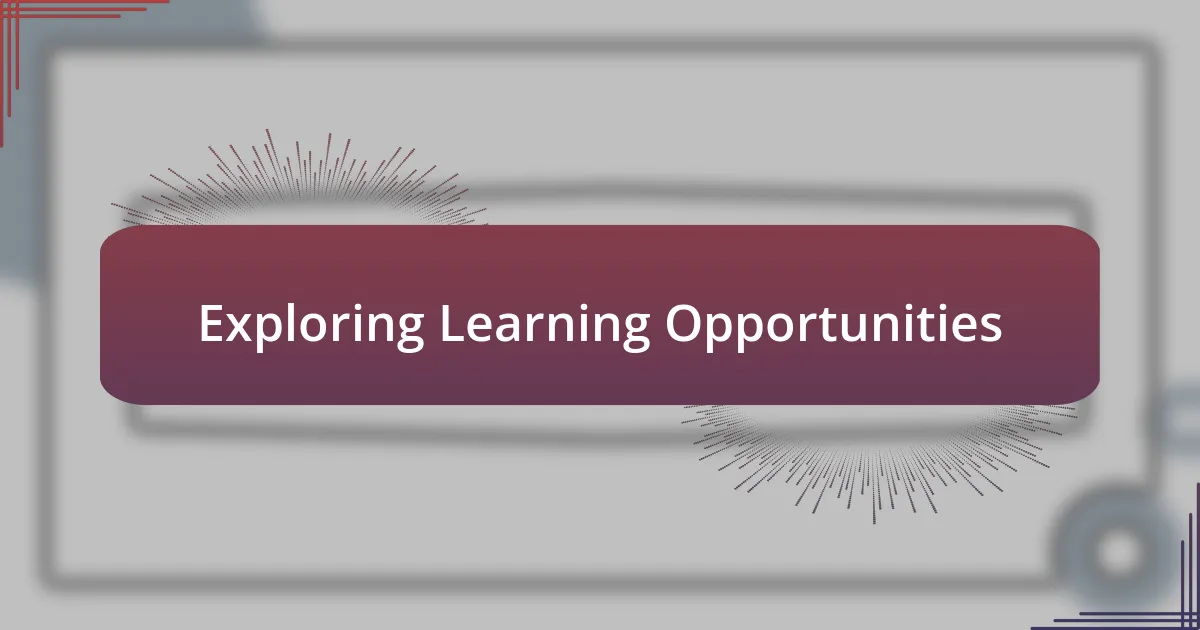
Exploring Learning Opportunities
Exploring the learning opportunities that NFT games provide has been a game-changer for me. Each moment spent strategizing or trading has taught me essential skills like critical thinking and negotiation. Recently, I found myself caught in a dynamic marketplace, where I had to evaluate the worth of my tokens against what others were seeking—an experience that felt oddly reminiscent of my early days in business school.
The educational aspect doesn’t stop at gameplay mechanics; it extends to understanding blockchain technology and its implications. I recall the first time I explained how smart contracts work to a friend, and I realized that I had not just learned something new, but had also gained the ability to teach it. This concept of shared knowledge in the NFT gaming community truly enhances my learning experience, creating a vibrant ecosystem where everyone contributes to each other’s growth.
Moreover, I discovered that participation in community forums around these games is a treasure trove of insights. During a late-night discussion about new gameplay strategies, I encountered a player who had developed an innovative approach to resource management. That anecdote not only inspired me to adapt my own tactics but also highlighted the power of collaboration and collective intelligence in mastering skills through NFT games.
| Learning Opportunity | Description |
|---|---|
| Critical Thinking | Evaluating trades and game strategies fosters analytical skills. |
| Blockchain Understanding | Explaining concepts like smart contracts enhances your grasp of technology. |
| Community Engagement | Collaborating with others leads to shared learning and new ideas. |
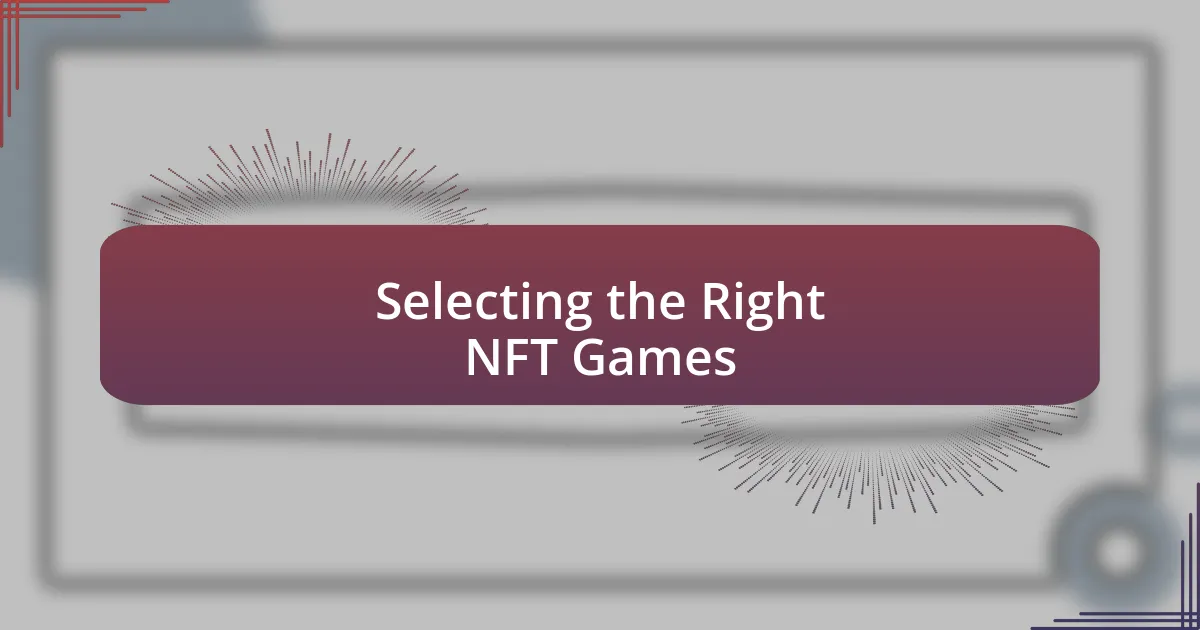
Selecting the Right NFT Games
Selecting the right NFT games is crucial for skill enhancement. I remember the excitement I felt when I stumbled upon a game that seamlessly blended strategy with community involvement. The adrenaline rush of making real-time decisions not only improved my gameplay but also translated into valuable skills in everyday life. The right choice can turn a pastime into a learning experience that genuinely enriches your skill set.
When hunting for suitable NFT games, consider these factors:
- Gameplay Complexity: Look for games that challenge you with varied mechanics; the more you grapple with the game’s strategies, the more you’ll learn.
- Community Size and Activity: A vibrant community means more discussions, strategies, and collaborations, which are essential for personal growth.
- Educational Features: Games that incorporate tutorials or guides about NFT and blockchain technology can significantly back your learning journey.
- Market Dynamics: Choose games that involve trading or economic elements, as they enhance your negotiation and analytical skills.
- Developer Reputation: Opt for well-regarded games to ensure a quality experience filled with opportunities for learning and interaction.
These elements have personally shaped my journey in the NFT gaming world, driving both my enthusiasm and knowledge forward.
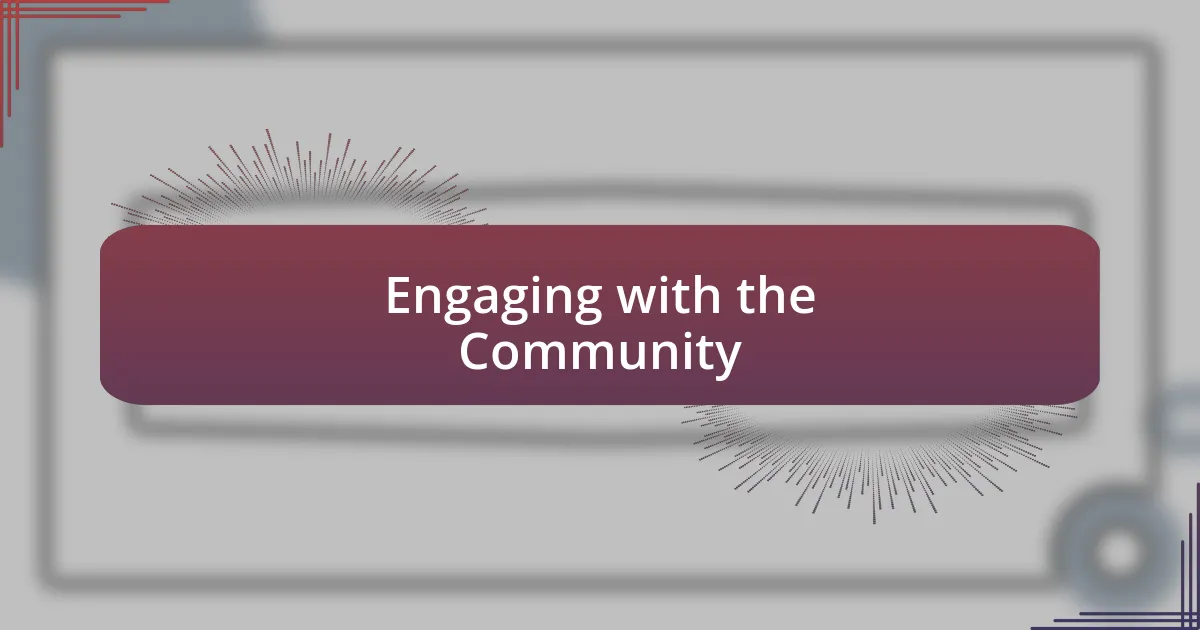
Engaging with the Community
Once I got involved in the NFT gaming community, I quickly realized how essential it was to engage with others. I vividly recall joining a Discord server dedicated to one of my favorite games; the conversations brimmed with strategy, updates, and personal stories from players around the globe. It struck me how sharing experiences not only offered new insights but also forged connections that went beyond the digital realm.
In these community discussions, I learned to value different perspectives. One evening, as I was contemplating a tough gameplay choice, I asked for advice, and the responses poured in. The collective wisdom that emerged helped me refine my approach and also boost my confidence, demonstrating how communal support can be a powerful tool in skill enhancement. Have you ever felt that spark of inspiration from a fellow gamer’s story?
Participating in community events, such as tournaments and collaborative quests, has been particularly rewarding for me. I remember a recent event where teamwork was crucial to success. Having to strategize and communicate with my teammates not only improved my gameplay but also taught me essential skills in leadership and cooperation. Engaging actively with others fosters a sense of belonging and provides practical experiences that resonate deeply in my real-life interactions.
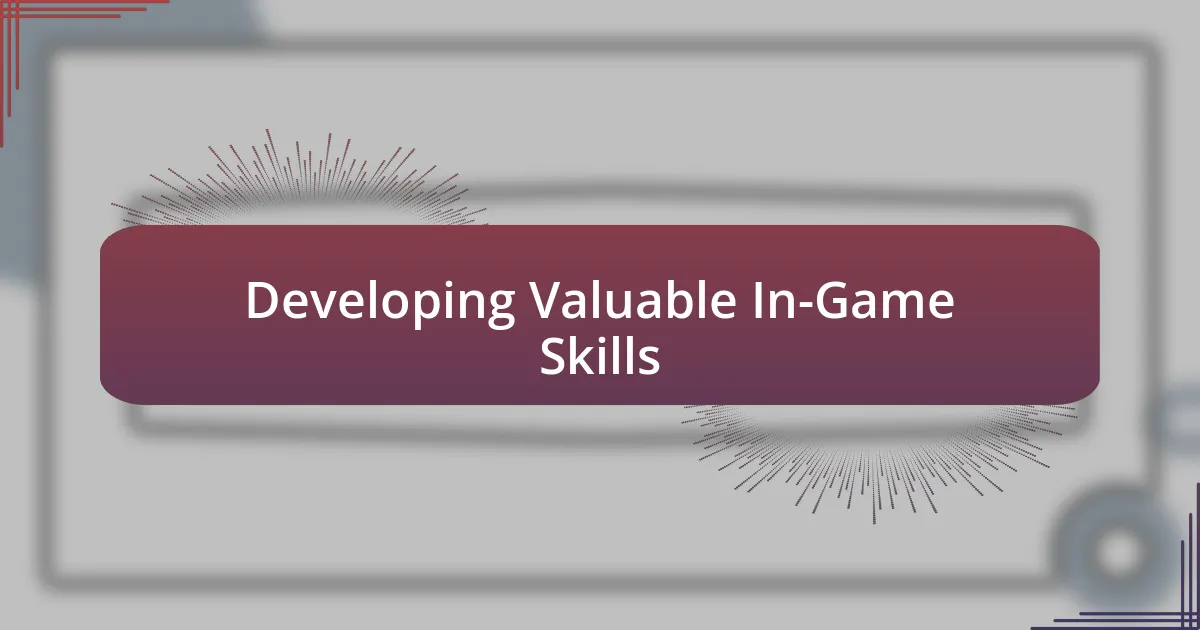
Developing Valuable In-Game Skills
Developing in-game skills is all about practice and adaptability. I remember when I first started playing an NFT game that emphasized strategy and quick thinking. I spent hours analyzing my moves and learning from my mistakes. Each time I faced a challenging boss, I experimented with different approaches and tactics. The thrill of finally defeating a difficult opponent taught me how resilience can translate directly into skill development.
As I delved deeper, I also discovered the importance of resource management within the game. During one session, I was struggling with limited resources, and frustration was creeping in. I decided to meticulously plan my next steps, considering every choice carefully. That moment shifted my perspective; I realized that strategic foresight is just as vital in the game as it is in real life. Have you ever faced a situation where the pressure taught you more than success could?
Another key lesson was mastering the art of collaboration. When my friends and I teamed up for a challenging raid, I learned how communication can enhance our overall performance. Striking a balance between asserting my ideas and listening to others made our synergy powerful. It was a rewarding experience that reminded me of how teamwork often leads to better outcomes, a principle that extends beyond gaming into my everyday life.
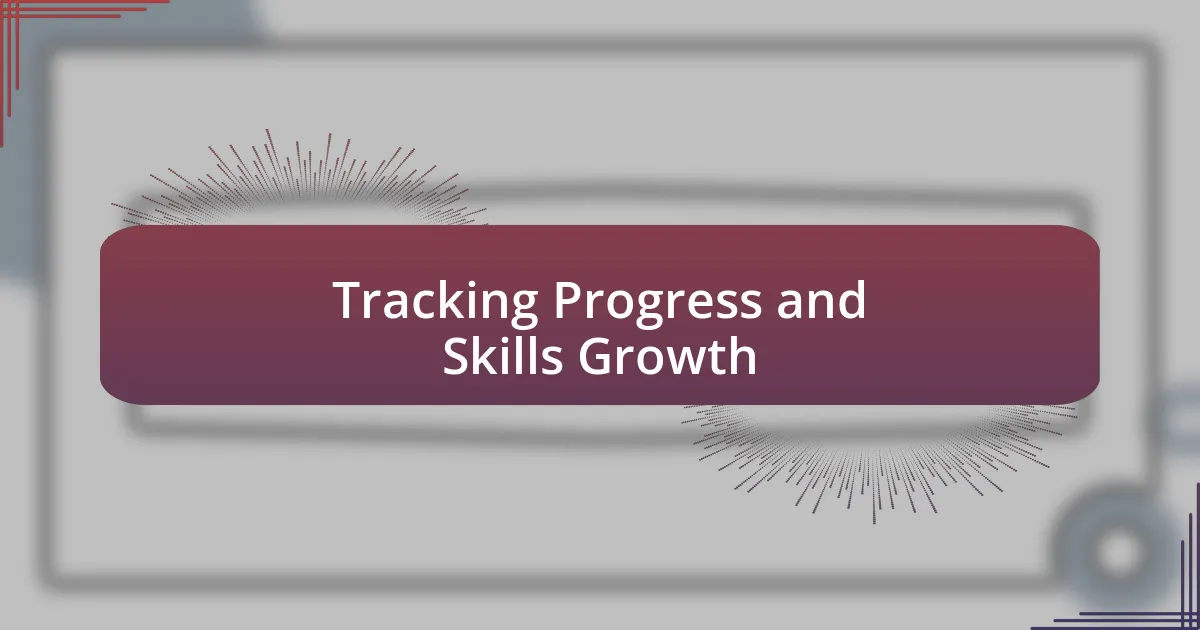
Tracking Progress and Skills Growth
Tracking my progress in NFT games became a crucial part of my journey. Initially, I started keeping a simple log of my gaming sessions, noting down successes, failures, and the strategies I employed. It felt a bit tedious at first, but looking back at my notes, I could see a clear path of growth. Have you ever taken a moment to reflect on how far you’ve come? I found that those insights fueled my motivation to keep evolving.
As I advanced, I began utilizing in-game metrics that highlighted not just my achievements, but specific skills I was developing, like strategic planning and quick decision-making. Watching those numbers rise felt rewarding, almost like hitting PBs in a workout routine. It made me realize that tracking isn’t just about numbers; it’s also about understanding my strengths and identifying areas that need improvement. Was there ever a moment when data made you rethink your approach?
Another technique I adopted was setting personal goals aligned with my progress. I’d choose a skill—let’s say, enhancing my character’s combat abilities—and dedicate a session purely to that. This focused approach allowed me to gain a deeper understanding of combat mechanics while tracking my evolution. The sense of accomplishment I felt after reaching those goals was invigorating. Isn’t it fascinating how structured tracking can lead to such profound personal rewards?
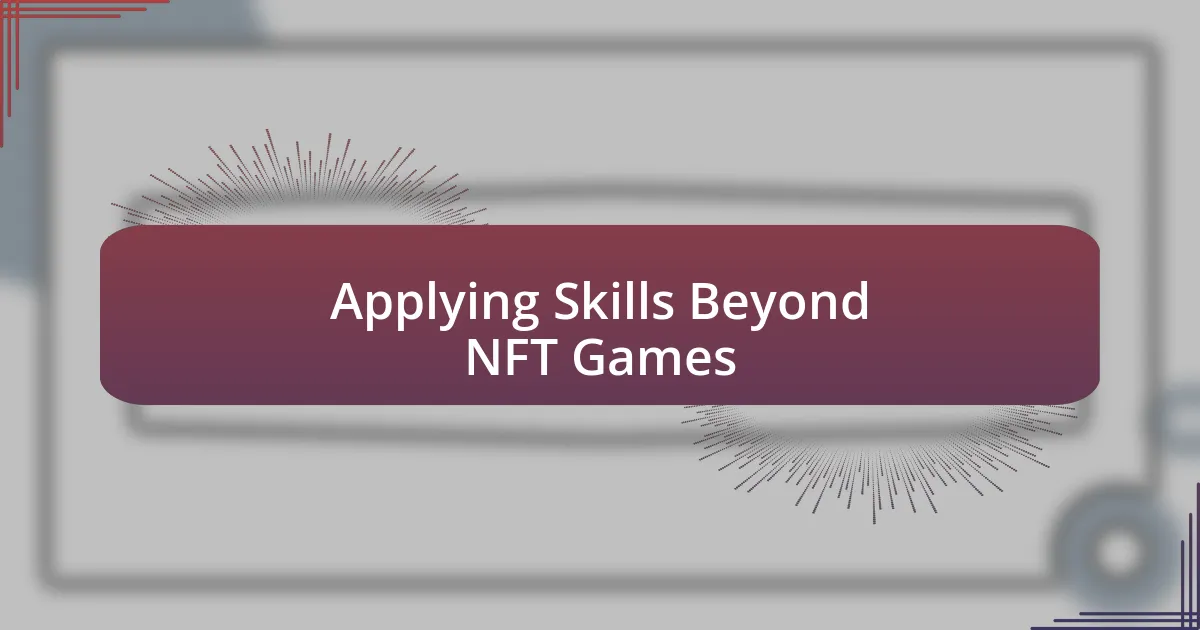
Applying Skills Beyond NFT Games
As I transitioned from NFT games to real-world applications, I found that the skills I developed were surprisingly transferable. For instance, strategic planning became second nature; I often catch myself applying these skills in my professional life, whether it’s project management or optimizing workflows. Have you ever considered how a game strategy might solve a problem at work?
Collaboration is another area where my gaming experience has proven invaluable. During team raids, effective communication and teamwork were essential, and I’ve since adopted those communication strategies in my day-to-day interactions. I remember leading a team project recently, and it felt like orchestrating a well-timed in-game raid—everyone needed to play their part, and clarity was key. Isn’t it interesting how the lessons we learn in one area can enhance our efficacy in another?
Moreover, the financial acumen I gained from navigating the NFT market equipped me to make better investment decisions in real life. I’d analyze trends and anticipate shifts, skills honed through countless virtual transactions. That level of insight has helped me approach personal finance with a sharper mindset. Have you ever had a breakthrough in a completely unrelated field because of a skill you developed elsewhere?

